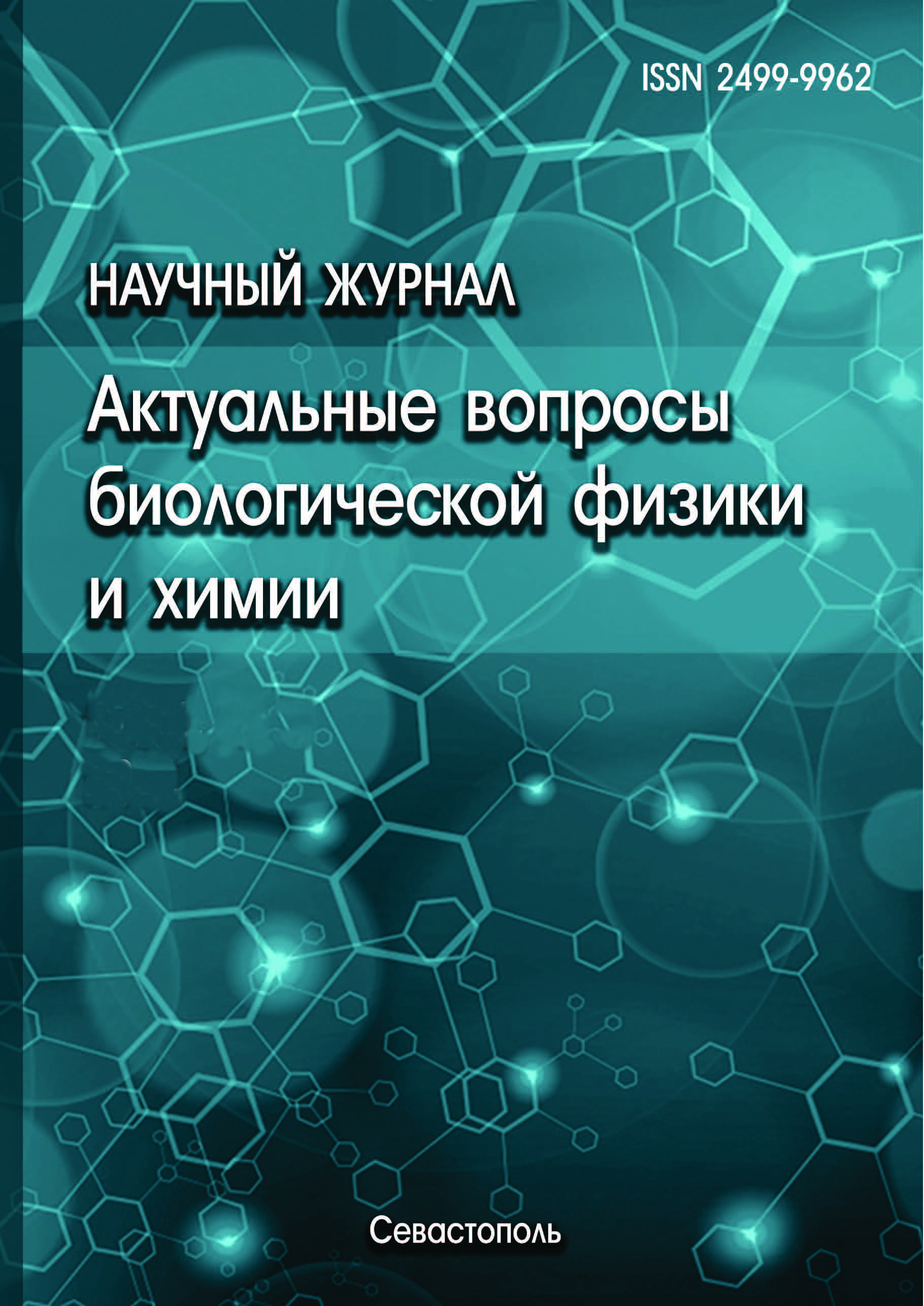Sevastopol, Sevastopol, Russian Federation
Sevastopol, Sevastopol, Russian Federation
The wide application of biological objects low-temperature storage methods requires studying the temperature influence mechanisms at the molecular level. The effect of +10÷+38°C temperature range on hemoglobin A was studied using the methods of temperature-perturbation spectrophotometry and absorption spectra first derivatives analysis. The ΔE/E dependence on temperature for hemoglobin A solution is of an S-shaped form. On the ΔE/E dependence on temperature for hemoglobin A, breaks are observed: the first in +25÷+27°C temperature range and the second break in +33÷+35°C temperature range. In the experiment performed on myeloma immunoglobulin G, the S-shaped dependence of the temperature-differential spectra intensity on temperature was obtained, which has breaks at +25 and +35°C. The authors attribute this S-shaped dependence to the conformational transition presence in +25÷+35°C temperature range. Apparently, it can be assumed that in the hemoglobin A molecule, conformational changes occur in +25÷+35°C temperature range of +25÷+35°. According to spectrophotometry data, the globin conformational state changes at temperatures around +26÷+30°C. Our studies data indicate the conformational rearrangements presence in the hemoglobin molecule at 25 and 35°C. Our data, presumably indicating a change in the structure of human hemoglobin A at a temperature of about 25°C, are probably confirmed by other studies using dynamic light scattering, incoherent light scattering, IR spectroscopy, studies for intraerythrocyte hemoglobin A of donor blood 5 days of storage on oxyhemoglobin A content, according to which, since a decrease in oxyhemoglobin A content and hemoglobin molecule oxygenation is associated with its conformational state, it is possible that at 25°C a change in the hemoglobin A molecule conformational state begins to appear, which can contribute to a more pronounced decrease in oxyhemoglobin A content. The peculiar properties of HbA, which determine the presence of a special temperature of about 25°C on the various hemoglobin parameters temperature dependences, require further study in comparison in different temperature ranges.
hemoglobin, conformational changes, temperature
1. Stadler R.R., Soyka M.B. A prospective pilot study comparing nasal blood sampling and venipuncture for the assessment of hemoglobin levels and INR. Laryngoscope, 2017, vol. 127, no. 3, pp. 577-581.
2. Michnik A., Drzazga Z., Kluchewska A., Michalik K. Differential scanning microcalorimetry study of the thermal denaturation of haemoglobin. Biophys. Chem., 2005, vol. 118, no. 2-3, pp. 93-101, doi: 10.1016 /j.bpc.2005.06.012. DOI: https://doi.org/10.1016/j.bpc.2005.06.012; EDN: https://elibrary.ru/LXZTIN
3. Mauer J., Peltomaki M., Poblete S., Gompper G., Fedosov D.A. Static and dynamic light scattering by red blood cells: A numerical study. PLoS One, 2017, vol. 12, no. 5, e0176799, doi:https://doi.org/10.1371/journal.pone.0176799. EDN: https://elibrary.ru/YGVMFN
4. Rossi-Bernardi L., Roughton F.J. The specific influence of carbon dioxide and carbonate compounds on butter power and Bohr effects in human haemoglobin solutions. J. physiol, 1967, vol. 189, pp. 1-29.
5. Fermi G. Three-dimensional Fourier syntess of human deoxyhaemoglobin at 2,5 A° resolution: refinement of the atomic model. J.mol. biol., 1975, vol. 97, pp. 237-256.
6. Takano T. Structure of myoglobin refinsd at 2,0 A° resolution. J. mol. biol., 1977, vol. 110, pp. 533-584.
7. Perutz M.F. Stereochemistry of cooperative effects in haemoglobin. Nature, 1970, vol. 228, pp. 726-739.
8. Zavialov V.P., Troitsky G.V., Demchenko O.P., Generalov I.V. Temperature and pH dependent changes of immunoglobulin G structure. Biochim et biophys. Acta, 1975, vol. 386, p. 155.
9. Stadler A.M., Digel I., Artmann G.M., Embs J.P., Zaccai G., Buldt G. Hemoglobin dynamics in red blood cells. Correlation to body temperature. Biophys. J., 2008, vol. 95, no. 11, pp. 5449-5461.
10. Stadler A.M., Garvey C.J., Bocahut A., Sacquin-Mora S., Digel I., Schneider G.J., Natali F., Artmann G.M., Zaccai G. Thermal fluctuations of haemoglobin from different species: adaptation to temperature via conformational dynamics. Journal of the royal society interface, 2012, doi:https://doi.org/10.1098/rsif.2012.0364.
11. Abaturov L.V., Molchanova T.P., Nosova N.G., Schlyapnikov S.V., Faizullin D.A. Conformational dynamics of tetramer hemoglobin molecule by hydrogen exchange data. I. Influence of pH, temperature and binding of ligands. Molecularnaya biologiya, 2006, vol. 40, no. 2, pp. 326-340. (In Russ.) EDN: https://elibrary.ru/KXBMMB
12. Weickert M.J., Apostol I. High-fidelity translation of recombinant human hemoglobin in Escherichia coli. Applied and environmental microbiology, 1998, vol. 64, no. 5, pp. 1589-1593.
13. Santiago P.S., Moura F., Moreira L.M., Dominques M.M., Santos N.C., Tabak M. Dynamiclight scattering and optical absorption spectroscopy study of pH and temperature stabilities of the extracellular hemoglobin of Glossoscolex paulistus. Biophysical journal, 2008, vol. 94, no. 6, pp. 2228-2240.
14. Artyuhov V.G., Putintseva O.V., Savostin V.S. Physic-chemical properties and termostability of human hemoglobin molecule modified by reopolyglukin and dialdegiddextrane. Biofizika, 2006, vol. 51, no. 3, pp. 430-439. (In Russ.) EDN: https://elibrary.ru/HTEEOB
15. Webb K.L., Dominelli P.B. Influence of high hemoglobin-oxygen affinity on human during hypoxia. Front. Physiol, 2022, doi:https://doi.org/10.3389/fphys.2021.763933. EDN: https://elibrary.ru/PIREVU










